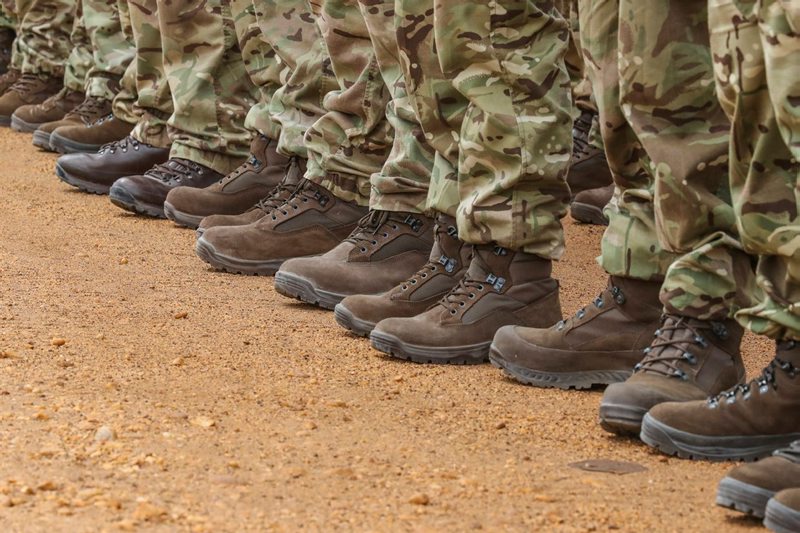
A number of retired Military personnel and academics have written an open letter to the Prime Minister ahead of the General Election, reflecting concerns from across all three services, regardless of rank, about the effect of under funding on Britain’s security.
With defence pledges not seen as a top priority by many voters, these ‘top brass’ personnel want to highlight the defence and security issues facing Britain in an ever-changing world and in particular the security challenges arising from leaving the EU.
Personnel signing the letter range from retired Admirals, Generals and Air Marshals, to former colonels and corporals and academics in the arena.
The letter states that whoever will be the next Prime Minister should have a brutally honest assessment of the Armed Force capabilities and what the budget will allow, with spend discrepancies having already been highlight by the Public Accounts Committee and National Audit Office.
The letter highlights areas of concern from the personnel, running from Brexit to NATO commitments, equipment spend to the SDSR2015, and doesn’t mince words, with areas such as ‘creative defence accounting’ termed as straight ‘deception’ by the signatories. Worries over the fall in the pound and the knock on effect this has on dollar procured equipment
The greater prevalence of threats, both at home and abroad is a huge worry, with signatories wondering how the UK can respond to these threats, in particular in the face of leaving the EU.
The military personnel go on to praise the government’s 2015 Defence and Security Review, but while it has great intentions they say it has not been fully funded, with both the PAC and NAO bringing the equipment expenditure into question. The new aircraft carriers will be a massive boon, but will they be equipped properly with missiles and jets, let alone have warships to protect them?
Hesitant to encourage yet another review, the signatories of the letter have urges the next government to get behind SDSR 2015 and fund it properly to ensure UK forces have the ability and resources to continue as a major defence power in the future.
The full text of the letter can be found below.
The nation hopes June’s election will produce a government strong enough to conduct the tough Brexit negotiations, promote wider trading partnerships and maintain our security. Only in a secure environment can we develop new relationships and thrive. Sadly, that security is threatened in almost every corner of the globe.
The newly elected prime minister will be confronted with the need for a brutally honest appreciation of the budget for and capabilities of the UK’s armed forces. A number of issues lead to this conclusion, not least the Public Accounts Committee (PAC) report on defence equipment procurement of 25 April.
The 2015 Strategic Defence and Security Review (SDSR) went a long way to restore the damage inflicted on Britain’s defences by the 2010 Review. SDSR 15 charted a praiseworthy path towards our future security which, post referendum, with the need to seek wider world trading agreements, is ever more essential.
But, while the policy remains in place, events have shown that the necessary funding is simply not there to give it substance. Responses by the MOD to questions about the adequacy of the defence budget raised by respected and informed commentators have been disingenuous, evading the issue by the relentless quoting of irrelevant financial statistics.
The following issues must be addressed:
Global threats continue to intensify. They range from nuclear sabre rattling over Crimea to risks to the very existence of NATO. A failure to protect the Baltic States adequately and Turkey’s open flirtation with hostile powers undermine this cornerstone of our national security. New extremist cells have emerged at home and added to Middle East chaos. China’s assertiveness and N Korea’s unpredictability pose existential threats to allies and to international trade.
Funding SDSR 15 relied on unidentified and economically questionable savings. Government boasts of spending 2% of GDP on defence are widely criticised as an accounting deception. Most analysts now agree core defence expenditure for hard military power is well below 2%.
The fall in the pound threatens the purchase of meaningful numbers of aircraft for our new carriers, the new Maritime Patrol Aircraft, the upgrading of Apache helicopters and the purchase of missiles for the replacement strategic deterrence submarines. While dollar expenditure has been hedged for this year, for future years it has not. The PAC report makes clear, that some $28.8bn of our foreign military purchases are exposed to currency fluctuations.
The PAC report states: “The affordability of the Equipment Plan is at greater risk than at any time since its inception.” Nearly all the contingencies money has been exhausted, yet much of the programme involves essential new equipment whose cost, experience shows, is likely to grow.
The armed services are having to seek further very damaging savings in manpower, support and training at a time when the likelihood of combat operations is increasing. These realities of the security situation must be faced. They have been largely kept from public debate despite the efforts of the media and the valedictory messages of recently serving senior officers, pointing out how equipment and manpower shortages undermine Britain’s ability to fight even a local war. Recent Royal United Services Institute war gaming confirms this view.
There may be a temptation to call for another Defence Review. We urge you not to do this. SDSR 15, as is widely recognised, set the right path for our long term security. The Labour government’s excellent review of 1998 was later weakened by budgetary infighting involving the then chancellor. Let us not go down that devious political path again. The solution is simple: fund the review properly and if this means a commitment to increase expenditure over the lifetime of the Parliament, then do it. There can be no better foundation for a future which demands an outward looking and globally trading United Kingdom. Reversing any part of it will damage our international credibility, weaken our chances of forging strong global partnerships and further erode our ability to defend ourselves and our allies.
If you would like to join our community and read more articles like this then please click here
Budget Equipment General Election 2017 Government MOD SDSR 2015








